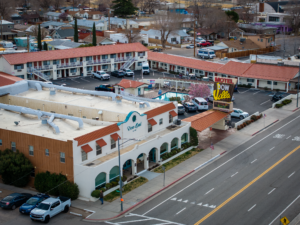Airbnb Files for IPO as Reeling Hotel Industry Struggles to Recover
Airbnb Files for IPO as Reeling Hotel Industry Struggles to Recover
Home-Sharing Provider’s Funding Could Help It in Pandemic, Challenge Hospitality Sector
CoStar News
August 19, 2020 | 4:32 P.M.
Home-sharing company Airbnb officially filed its intention to embark on an initial public offering, catching the hotel industry off guard at a point when it is struggling to recover from the pandemic.
The San Francisco-based firm, credited for popularizing the modern short-term home rental industry, told CoStar News it filed the initial paperwork to go public with the Securities and Exchange Commission Wednesday. Airbnb did not disclose the number of available shares or the price range at which they would be offered. The announcement of the filing did not disclose any financial results to give potential investors any indication of how the company is performing in the pandemic.
The move could position Airbnb to emerge from the pandemic with financial momentum, potentially setting the stage for it to snap up more market share in the hospitality industry just when hotel properties have reported their biggest, most dramatic drop in modern history. It comes in the same week as the S&P 500 has reached a record high.
As more travelers begin to consider venturing away again, Airbnb has been recommending that hosts to use Centers for Disease Control cleaning protocols and share that with their guests, a move that can position the service as an alternative in a pandemic to traditional hotels because of some of their remote locations, limited guests and fewer touch points.
Even so, the company’s plan to tap into the public market comes during an economic recession, unprecedented unemployment and a pandemic that has hobbled domestic and international tourism.
“I cannot imagine a worse time to be doing an IPO on a lodging company,” said Alan Reay, CEO of hotel brokerage and consultancy firm Atlas Hospitality Group, of Airbnb’s plans. While Reay’s business relies on the hotel industry, he argues that an IPO may not be enough to successfully propel the company ahead of the traditional hospitality sector.
“I really do not think it will have a big impact on the hotel industry,” he said. “Airbnb has a lot of work to do in establishing a standard cleaning and sanitization protocol, and many visitors are going to be concerned about that. All of the major hotel companies have already initiated protocols and systems, but I think this is impossible for Airbnb to implement.”
Prior to the acceleration of confirmed U.S. coronavirus cases after the Fourth of July holiday, hotel analysts said short-term rentals were faring better than traditional hotels, many of which remain closed because of lack of business or local ordinances. According to data from STR, a company owned by CoStar, and short-term-rentals analytics company AirDNA, short-term-rental occupancy hit a low of 34.3% in mid-March while hotels reported 17.5%.
The announcement comes as a slow rise in demand for U.S. hotel rooms shows signs of dragging the hospitality industry’s recovery from the pandemic into 2024, longer than originally expected. Demand and room revenue have been improving over the past several months, but new estimates indicate that’s not fast enough for the industry to fully recover to last year’s level until several years from now.
Hotel demand, which fuels occupancy, is not expected to fully recover until 2023, and room revenue is expected to be restored to pre-pandemic levels by 2024, according to new data from the hotel research firm STR, which is owned by CoStar Group, the publisher of CoStar News, and Tourism Economics, a division of Oxford Economics.
STR reported more small improvements for the week that ended Aug. 8. U.S. hotel occupancy, however, fell just shy of 50%, a 1 percentage point gain from the previous week. “This probably is a trend we will see all the way through August,” Jan Freitag, STR’s senior vice president for lodging insights, previously told CoStar.
Delayed Plans
Airbnb, headquartered at 999 Brannan St., has been funded by private investors and venture capital since it was founded in 2008. It offers a service that allows residential property owners to rent out their houses, and apartment renters to rent their abodes. It provides competition to hotels by offering sometimes lower-priced accommodations that often include kitchens, which also can take business away from restaurant owners. The competition can be a concern in popular vacation areas.
The company and its rivals have come under increased scrutiny and local regulation by towns and cities as short-term rentals have grown in popularity. Short-term rental rules have been passed in cities such as New York, Boston, Chicago, Washington, D.C., and Los Angeles.
Airbnb had initially planned to go public last year after a string of record-setting revenue, fundraising and geographical expansions. Those plans were pushed to sometime this year.
Then the health crisis ravaged tourism economies around the world and sent Airbnb into its own rabbit hole of diminished business and substantial layoffs. The company’s IPO plans had again appeared to be shoved to the back burner.
In May, Airbnb laid off 1,900 workers, or 25% of its staff, as it scrambled to adapt to the travel industry’s unexpected shutdown. CEO Brian Chesky said at the time the company’s revenue was expected to be less than half of the $4.8 billion it reported last year, and it pulled back on investments in transportation and hotel partnerships.
“We are collectively living through the most harrowing crisis of our lifetime,” Chesky told staffers in an email, adding that the company needs to “reduce our investment in activities that do not directly support the core of our host community.”
According to CoStar data, the company currently leases nearly 915,200 square feet of space across the San Francisco Bay Area, about 268,360 square feet of which it plans to soon vacate in Santa Clara, California.
Alan Reay atlashospitalitygroup hospitalityindustry hotelnews


